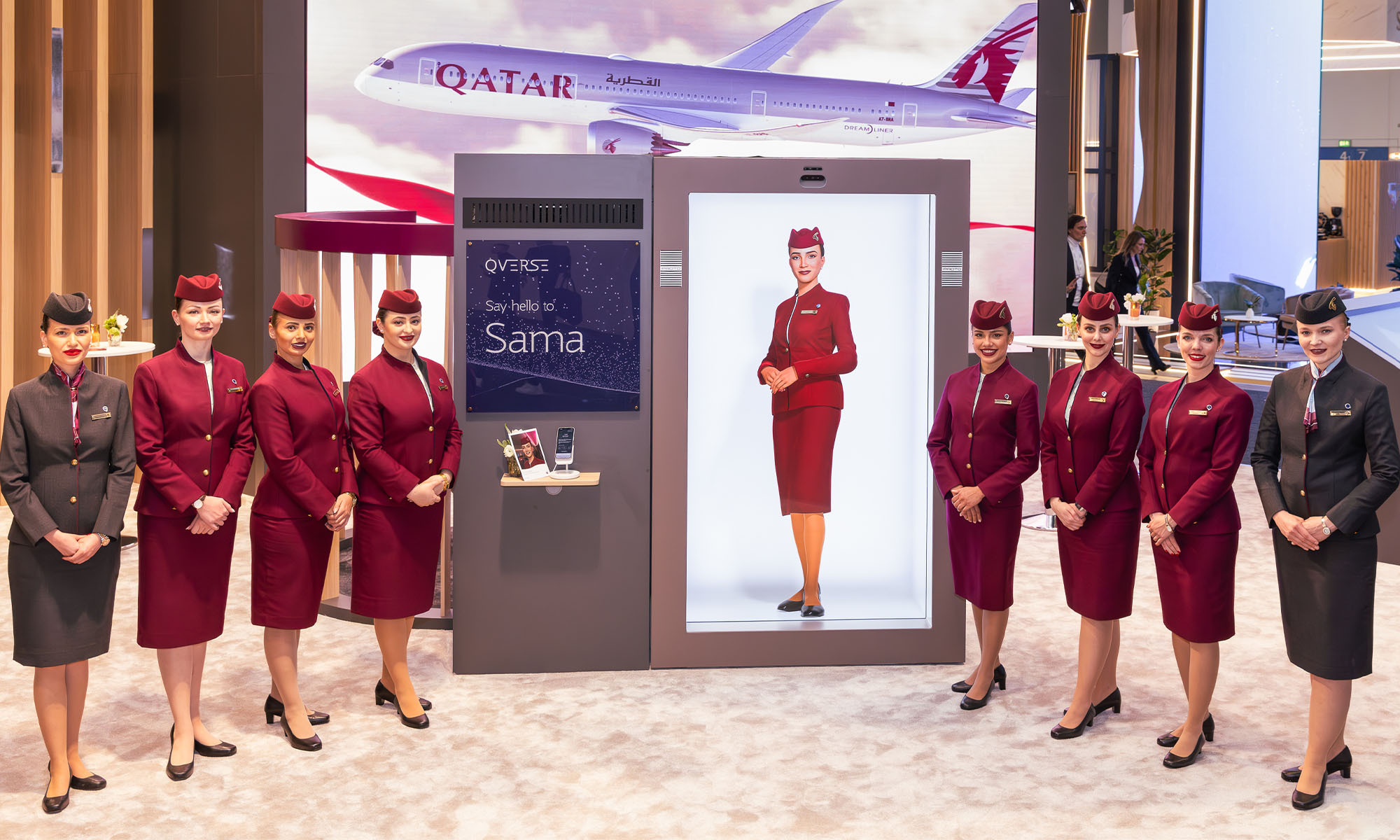News
Qatar Airways Unveils The World’s First AI Cabin Crew
The Gulf carrier has set new standards by being the first to use AI to improve passenger experiences.

National carrier Qatar Airways has unveiled Sama 2.0, the world’s first AI-enhanced “digital human cabin crew” at ITB Berlin 2024. Sama, meaning “sky” in Arabic, can learn from passengers to enhance her responses. She even has a backstory of growing up in Doha and undergoing specialist training as a flight attendant.
The updated version 2.0 of Sama provides responses in real-time and can answer FAQ-style queries, brief passengers on their destinations, and offer support and advice. Sama is accessed through QVerse, Qatar Airways’ latest digital platform, and can also be found in the airline’s official app.
Sama was developed in collaboration with UneeQ, a company specializing in “digital humans” for corporate branding projects.
Qatar Airways is experiencing a significant surge in demand as travel recovers after the pandemic. According to Chief Commercial Officer Thierry Antinori, customers are becoming more selective with their travel decisions and often opting for higher-quality options.
Also Read: UGREEN Nexode Pro Review: Portable Yet Powerful Chargers
The shift in consumer behavior is beginning to drive a wider gap between top-tier airlines and more budget-oriented options. As a result, Gulf carrier Qatar Airways finds itself in a price and quality bracket that includes powerhouses like Emirates and Etihad, which explains the push for innovative experiences from technologies like Sama 2.0.
Despite intense competition, Qatar Airways has experienced a 31% increase in traffic this year, which can be attributed to the expansion of its network and an overall surge in global travel.
News
Rabbit Expands Hyperlocal Delivery Service In Saudi Arabia
The e-commerce startup is aiming to tap into the Kingdom’s underdeveloped e-grocery sector with a tech-first, locally rooted strategy.

Rabbit, an Egyptian-born hyperlocal e-commerce startup, is expanding into the Saudi Arabian market, setting its sights on delivering 20 million items across major cities by 2026.
The company, founded in 2021, is already operational in the Kingdom, with its regional headquarters now open in Riyadh and an established network of strategically located fulfillment centers — commonly known as “dark stores” — across the capital.
The timing is strategic: Saudi Arabia’s online grocery transactions currently sit at 1.3%, notably behind the UAE (5.3%) and the United States (4.8%). With the Kingdom’s food and grocery market estimated at $60 billion, even a modest increase in online adoption could create a multi-billion-dollar opportunity.
Rabbit also sees a clear alignment between its business goals and Saudi Arabia’s Vision 2030, which aims to boost retail sector innovation, support small and medium-sized enterprises, attract foreign investment, and develop a robust digital economy.
The company’s e-commerce model is based on speed and efficiency. Delivery of anything from groceries and snacks to cosmetics and household staples is promised in 20 minutes or less, facilitated by a tightly optimized logistics system — a crucial component in a sector where profit margins and delivery expectations are razor-thin.
Despite the challenges, Rabbit has already found its stride in Egypt. In just over three years, the app has been used by 1.4 million customers to deliver more than 40 million items. Revenue has surged, growing more than eightfold in the past two years alone.
Also Read: Top E-Commerce Websites In The Middle East In 2025
CEO and Co-Founder Ahmad Yousry commented: “We are delighted to announce Rabbit’s expansion into the Kingdom. We pride ourselves on being a hyperlocal company, bringing our bleeding-edge tech and experience to transform the grocery shopping experience for Saudi households, and delivering the best products – especially local favorites, in just 20 minutes”.
The company’s growth strategy avoids the pitfalls of over-reliance on aggressive discounting. Instead, Rabbit leans on operational efficiency, customer retention, and smart scaling. The approach is paying off, having already attracted major investment from the likes of Lorax Capital Partners, Global Ventures, Raed Ventures, and Beltone Venture Capital, alongside earlier investors such as Global Founders Capital, Goodwater Capital, and Hub71.























